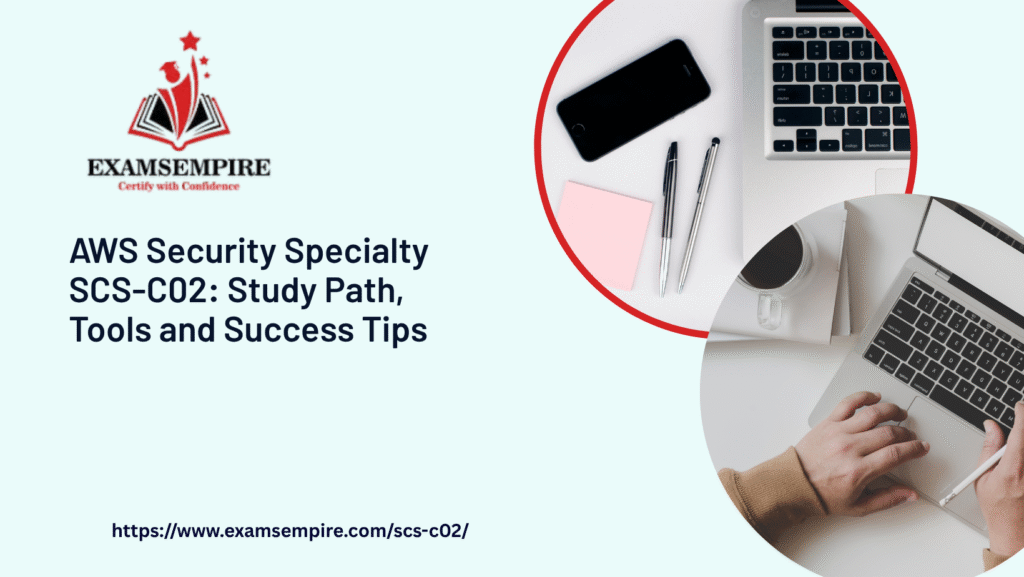In today’s cloud-first technology landscape, security is no longer an afterthought—it is a foundational requirement. For those working with the AWS cloud platform who want to demonstrate deep security expertise, the AWS Certified Security – Specialty (SCS-C02) certification offers a compelling credential.
What is the SCS-C02 Certification?
The AWS Certified Security – Specialty (SCS-C02) exam is a specialty-level certification designed by AWS to validate advanced skills in securing AWS environments. It proves your expertise in creating and implementing security solutions in the AWS Cloud.
The exam is meant for individuals with strong experience in IT security and hands-on AWS workloads. Candidates should ideally have at least two years of practical experience securing AWS workloads and several years in designing and implementing security solutions in general.

Why Take This Certification?
There are several key reasons:
- Credibility & expertise: This certification shows employers that you can design, monitor, and manage security in AWS environments effectively.
- Updated content: The SCS-C02 version reflects current AWS security concerns such as governance, incident response, and data protection.
- Career differentiation: As more organizations migrate to the cloud, AWS security specialists are in higher demand.
What’s New & Exam Domains
The SCS-C02 version includes updated domains, new tools, and a heavier focus on governance and automation. Below is a summary of the main domains and their approximate weightings:
- Threat Detection and Incident Response (14%) — Identifying and responding to security incidents in AWS using services like Security Hub, GuardDuty, and Detective.
- Security Logging and Monitoring (18%) — Designing centralized logging and monitoring solutions using CloudWatch, CloudTrail, and related tools.
- Infrastructure Security (20%) — Securing compute, network, and storage components through best practices such as segmentation, patching, and DDoS mitigation.
- Identity and Access Management (16%) — Managing users, roles, policies, and access controls using IAM and related tools.
- Data Protection (18%) — Encrypting data at rest and in transit, key management, and data lifecycle policies.
- Management and Security Governance (14%) — Implementing centralized account strategies, compliance frameworks, and security policies using AWS Organizations and related services.
Exam Format & Logistics
Here are the key details you need to know:
- Question format: 65 multiple-choice and multiple-response questions.
- Time limit: 170 minutes.
- Cost: USD 300 (subject to local taxes and currency conversion).
- Delivery method: Available at testing centers or as an online proctored exam.
- Validity: Certification is valid for three years.
AWS occasionally releases new versions of certifications, so always confirm the exam code and timeline before registering.
For more information visit us
Who Should Take It?
This certification is best suited for professionals who:
- Have hands-on experience with AWS services and security configurations.
- Are responsible for designing and maintaining secure architectures in the cloud.
- Want to move into specialized roles like Cloud Security Architect, DevSecOps Engineer, or Security Operations Lead.
It’s not recommended for beginners—those new to AWS should start with an associate-level certification like AWS Solutions Architect – Associate before attempting this one.
How to Prepare: Strategy & Resources
- Study the Official Exam Guide: Review the blueprint to understand what topics are in scope.
- Get Hands-On Practice: Work directly with AWS services like IAM, KMS, CloudTrail, GuardDuty, and WAF to gain real experience.
- Enroll in Updated Study Courses: Choose courses that are specific to the SCS-C02 version, not older ones.
- Read AWS Whitepapers: Focus on the Security Pillar of the Well-Architected Framework, KMS best practices, and data protection guidelines.
- Take Practice Exams: Simulate real testing conditions with time-bound mock tests to identify weak areas.
- Understand Scenario-Based Questions: The exam often tests practical decision-making in real-world cases, not just theoretical knowledge.
- Create a Study Schedule: Plan your study weeks efficiently—allocate time for both theory and hands-on labs.
Common Pitfalls & Tips
- Using outdated material: Ensure your resources specifically mention the SCS-C02 version.
- Lack of real AWS practice: Reading alone won’t help—apply the concepts.
- Ignoring small domains: Even low-weight domains like governance can include tricky questions.
- Poor time management: Practice answering questions quickly and confidently.
- Over-reliance on dumps: Avoid exam dumps; they’re unethical and often inaccurate.
- Neglecting security automation: Learn how AWS services integrate for automated responses and compliance management.
After the Exam: What’s Next?
Once certified, you can:
- Add the credential to your professional profile to demonstrate verified expertise.
- Move toward senior or specialized cloud security roles.
- Continue learning through AWS’s advanced security and DevSecOps offerings.
The certification remains valid for three years, after which you must recertify or attempt the next version. Continuous learning is crucial because AWS regularly updates its services and security models.
Study Plan Example (4-Week Structure)
Week 1: Review the exam guide, study IAM and KMS in depth.
Week 2: Focus on threat detection, incident response, and logging.
Week 3: Practice infrastructure security and governance topics through AWS Labs.
Week 4: Take full practice exams, review weak areas, and read AWS security whitepapers.
The AWS Certified Security Specialty SCS-C02 pdf dumps certification is one of the most respected credentials for professionals aiming to master cloud security on AWS. It validates not only theoretical knowledge but also the practical ability to secure large-scale cloud deployments.
By following a structured study plan, focusing on hands-on labs, and using up-to-date materials, you can confidently approach the exam and succeed. Earning this certification can significantly advance your career, open new opportunities, and strengthen your position as a trusted cloud security

